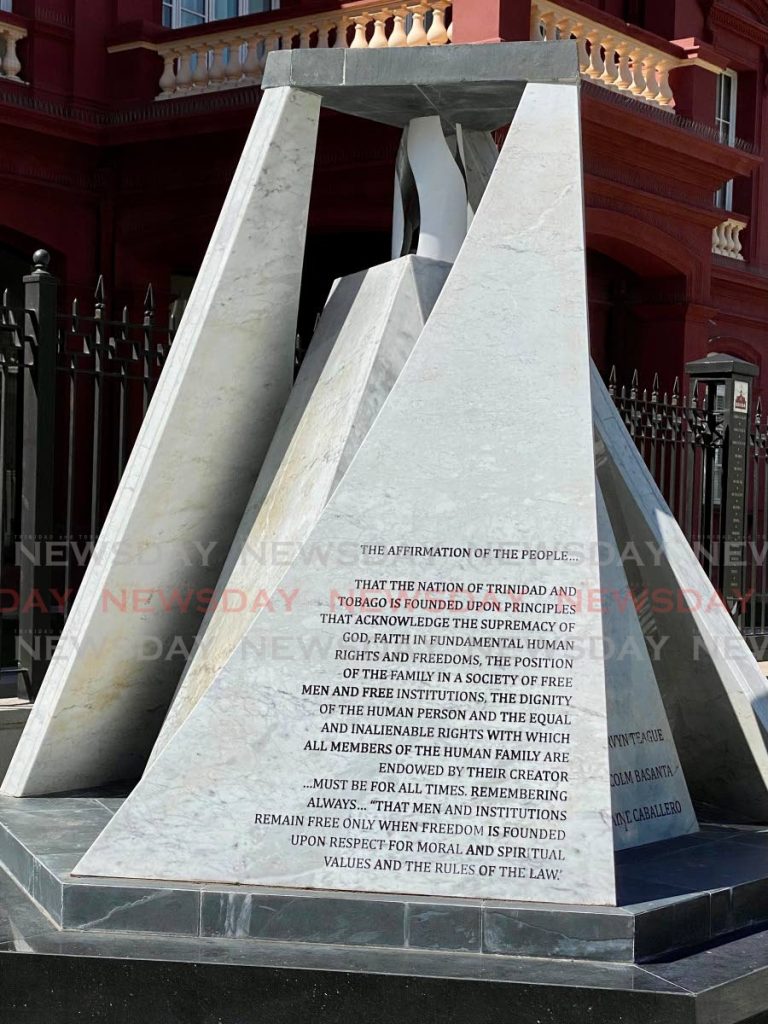Tablets of stone

DARRELL P ALLAHAR
ACCORDING TO the traditional account, when Moses came down from the mountain he got angry and broke the tablets of stone bearing the laws that were given to him.
Our Constitution is regarded as the supreme law.
The preamble to our Republican Constitution is a majestic and uplifting declaration of the ideals of our nation and identifying its founding principles. It acknowledges in particular that the people of TT “recognise that men and institutions remain free only when freedom is founded upon respect for moral and spiritual values and the rule of law.”
Those “moral and spiritual values” were unfortunately not defined, but the concept of the rule of law is understood as being one of the defining characteristics of a liberal democracy.
Justice Saunders, judge of the Caribbean Court of Justice (and now its President) in a presentation entitled “The Rule of Law in the Caribbean” (St Kitts, March 9, 2017) summed up the concept nicely when he said:
“In my view the rule of law means a lot more than its most basic ingredients…the rule of law also implies legal accountability, fairness, respect for minorities, the observance of human rights, the separation of the powers and equality before the law.”
The rule of law demands that all people, from the highest officeholder to the lowliest citizen, must act in accordance with the law, but there is more to it than being “ruled by law.”
Justice Saunders in that presentation also said:
“Our Constitutions are excellent guarantors of the rule of law because they serve as a fundamental brake on tendencies to arbitrariness. They are designed to keep government in check; to constrain the actions of all the organs of the State, whether executive, legislative or judicial.”

Alas, despite all of these wonderful words, we continue to be plagued with arbitrariness, especially during this pandemic where the rule of law appears to be casually pushed aside by what has been coined “the new normal.”
Coming out of the lockdown, courts are now held virtually. During the lockdown, many cases in the magistrates’ courts were not called and were given new dates by notices. Afterwards, practice directions issued by the Chief Justice permitted hearings of summary matters to be adjourned if an electronic hearing was either not possible or was not “in the interests of justice.” Those directions declared that bail would continue until the next hearing, no doubt because many were unable to come before a magistrate for the opportunity to have their bail extended.
Can those practice directions regulate the progress of criminal complaints in the summary or magistrates courts, when the legislation requires that magistrates must adjourn matters and give a date in the presence and hearing of the parties or their attorneys? Accused people have a right to be heard when a matter is being adjourned. The effect of those practice directions is to suspend or alter the provisions of the Summary Court Act which deal with hearings and adjournments in those courts. Only the Parliament can amend that act. The Chief Justice is not the Parliament.
Then there are the covid19 regulations which for many months have prevented those holding liquor licences and cinema licences from operating under permission granted by their respective licensing laws. Can those regulations made by the Minister of Health under a separate act have the effect of suspending or amending those licensing acts? Again, only the Parliament can do so. The Minister of Health is not the Parliament.
Then, just before the general election people were reportedly given written self-quarantine orders by Ministry of Health officials under a vague and very general section in the Public Health Ordinance. They were informed that they must stay at home under penalty of a fine and imprisonment. It was only on August 30 that regulations were made to allow for mandatory home quarantine. Were all of those quarantine orders issued before then lawful? It is a serious thing to forcibly confine people to their homes. The legal authority to do so must be extremely clear of any doubt.
At the Knox Street side of the Red House there is a large jagged sailboat-looking monument made up of upright triangular marble slabs. On one of those slabs someone, full of patriotic fervour, engraved specific parts of the preamble and added enthusiastic phrases such as “The affirmation of the people” and “must be for all times remembering always.”
The final line on the engraving, instead of ending with “the rule of law,” boldly reads “the rules of the law.”
Apparently, someone obviously thought the original version of the preamble had a typo and tried to correct it.
After the millions of dollars spent on the restoration of the Red House, we still haven’t gotten the rule of law right.
No one with oversight of those works noticed or saw it fit to correct what was written in stone for posterity on this national monument. The preamble has been cut down and renamed “the affirmation of the people,” erasing any trace of its origin. It is now a recently invented and badly quoted pledge on a propped-up paving stone.
God forbid that our freedom relied only upon “the rules of the law” as opposed to the rule of law. If that were so, we would be subject to any and every law that came out of that brightly-coloured building or every regulation issued from the pens of ministers, without recourse to either the courts or the Constitution.
After Moses smashed the tablets of the laws, he was called up once more and told what the laws were, and he wrote them out on tablets of stone. I have no doubt he wrote them exactly as he was told with the accuracy befitting such important text.
This however is Trinidad, not Mount Sinai.
Our unfortunate monument will probably be there for the next 100 years right outside the House of Representatives, because no one will want to accept responsibility for it.
As they say, the devil is in the details.
Darrell P Allahar is an attorney

Comments
"Tablets of stone"